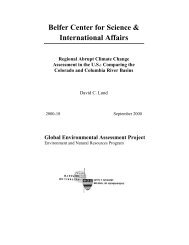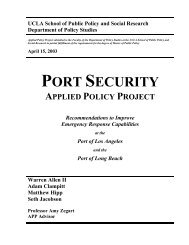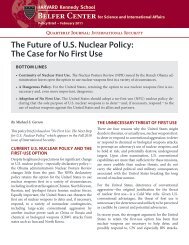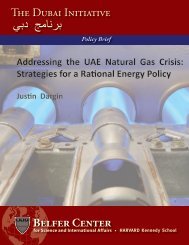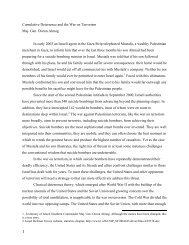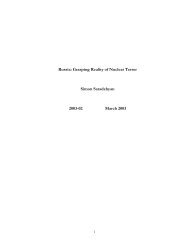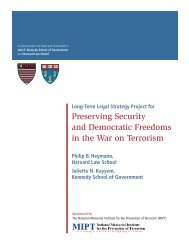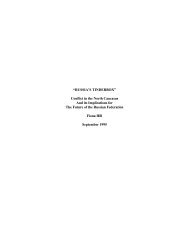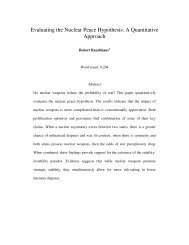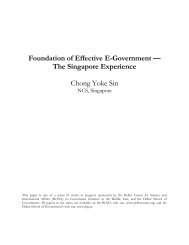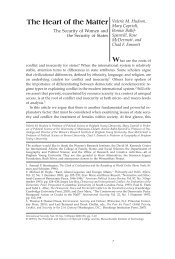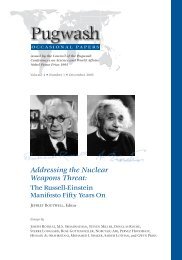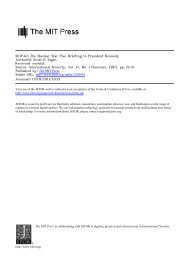Disrupting Escalation Of Terror In Russia To Prevent - Belfer Center ...
Disrupting Escalation Of Terror In Russia To Prevent - Belfer Center ...
Disrupting Escalation Of Terror In Russia To Prevent - Belfer Center ...
You also want an ePaper? Increase the reach of your titles
YUMPU automatically turns print PDFs into web optimized ePapers that Google loves.
IV. Trade-offs Between Security and Civil Liberties in <strong>Russia</strong>’s War on <strong>Terror</strong> 73<br />
An analysis of the trade-offs between security 74 and liberties in <strong>Russia</strong>’s war on terror<br />
demonstrates that enhancing the powers of the security apparatus at the expense of civil liberties<br />
in a given region may help reduce the threat of terrorism in the short term, as local agents of<br />
terror divert part of their operations to “freer regions.” However, our research indicates that such<br />
a strategy eventually backfires at the local level, as suppression of civil liberties generates<br />
political resentment that is among the root causes of terrorism. 75<br />
<strong>Russia</strong>ns elected Vladimir Putin as their president in 2000 partly, if not mostly, because<br />
he promised to curb terrorism in the wake of the apartment bombings that shocked the nation less<br />
than a year before. Putin and the majority of the general public then equated terrorism with<br />
Chechen separatism, and it was the latter that the <strong>Russia</strong>n army successfully quashed during the<br />
first years of Putin’s presidency. However, while putting an end to the self-proclaimed Chechen<br />
Republic of Ichkeria, the <strong>Russia</strong>n army did not and could not possibly have eradicated terrorism<br />
as such. As <strong>Russia</strong>’s Defense Minister Sergei Ivanov observed in 2004, trying to have army units<br />
73 This chapter represents an abridged version of Nabi Abdullaev and Simon Saradzhyan, “Trade-offs Between<br />
Security and Civil Liberties in <strong>Russia</strong>’s War on <strong>Terror</strong>,” research paper written for the Transnational Crime and<br />
Corruption <strong>Center</strong>, American University.<br />
74 While acknowledging that there is a broad spectrum of systemic threats to <strong>Russia</strong>’s security, the authors of this<br />
report focus on those posed by extremist and terrorist groups. We believe it is these groups that pose the most<br />
serious threat to <strong>Russia</strong>’s national security and their actions are both a genuine cause and a pretext for infringements<br />
on and outright suppression of liberties in <strong>Russia</strong>. The report highlights trade-offs between liberties and security in<br />
four parts of <strong>Russia</strong> that the authors found to be most representative for this purpose; however, due to a lack of<br />
evidence, this paper is by no means a comprehensive nationwide study and should not be considered as such. There<br />
are simply not enough data in the public domain for a quantitative analysis even by methods of basic multiple<br />
regressions. While there is a wealth of quantitative data on <strong>Russia</strong> as a country, making it possible to identify<br />
variables for a multiple regression comparing <strong>Russia</strong> to other nations (using, for example, independent indexes of<br />
freedoms and so on), such indexes are not available for individual regions of <strong>Russia</strong>.<br />
75 While noting that resentment over suppression of freedoms and rights is among the root causes of terrorism and<br />
militancy, the authors also acknowledge that poverty and slow economic growth make it easier for insurgents to<br />
recruit new foot soldiers, as argued in a recent authoritative and extensive study of factors that explain which<br />
countries run the risk of sinking into civil war. (See James D. Fearon and David D. Laitin, “Ethnicity, <strong>In</strong>surgency,<br />
and Civil War,” Department of Political Science, Stanford University, Stanford, August 2002.) <strong>In</strong> fact, this paper<br />
argues that political resentment is not among the factors that significantly increase the threat of a civil war. The<br />
focus, however, is on trade-offs between liberties and security and, thus, the authors do not dwell on economic<br />
factors; the report mentions the latter in passing, noting the stratification of society and using the relative share of<br />
33



